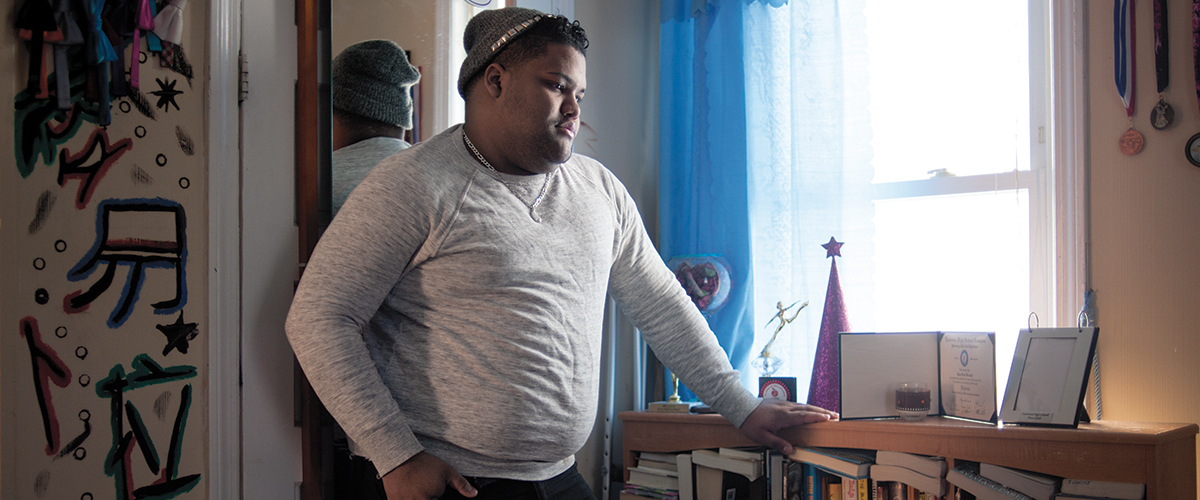There was a moment in Juan Bernabe’s high school career in which he just stopped. He stopped smiling. He stopped going out with friends. And most telling, he stopped dancing. Bernabe, you see, is always dancing. It was then that He stopped thinking about college, because college meant he would have to finish high school and in all that stillness, finishing high school seemed unlikely.
Bernabe was 11 when his parents divorced, and he and his mother emigrated to Lawrence, Mass., from the Dominican Republic in 2007. With a population of 77,000, Lawrence is more than three-quarters Latino. Most of the residents are of Caribbean descent from Puerto Rico and the Dominican Republic. The city—once a bustling mill town with textile factories among the largest in the world—had fallen on hard times. Today it is considered the poorest town in Massachusetts, with the highest crime and poverty rates in the state; last year, the state put its schools into receivership in an effort to turn around failing performance. But despite Lawrence’s reputation, Bernabe defends it as a vibrant and culturally dynamic place to live. As a child, he would walk to school along streets filled with busy bodegas and Caribbean restaurants, past the picturesque brick facades of the old mill buildings. Today, as a triple major at Denison, harboring hopes of medical school, he proudly points out the buildings where immigrant workers planned the Bread and Roses strike of 1912 that was instrumental in reforming U.S. labor laws.
Though he loved his city when he first arrived, school was different. Unlike his close-knit neighborhood, the Lawrence Public School system was massive— the high school alone housed 4,000 students, many of whom were American-born, and those who weren’t seemed to speak English with ease. Bernabe had always excelled in his studies back in the Dominican Republic, but when he entered seventh grade in America, he had to learn to excel in a new language. And it didn’t work. “
I was giving 150 percent, but it wasn’t good enough because I didn’t know English,” he says, sitting on the bed in his old room at home in Lawrence. “Even just having a conversation, I had to look up words in a dictionary.” In addition to the language barriers, Juan also had a secret—one that might cause trouble for him in the Latin male culture, often defined by its machismo: Bernabe is gay.
His mother, who herself had gone to college and worked in an agricultural bank in the Dominican Republic, worried for her son. “When he was younger, I never had to tell him to do his homework; now his love for school decreased because he didn’t know English,” she says. “I was really scared because everyone was saying bad things about Lawrence schools about gangs and drugs, but I put him in the hands of God to guide him through.”
Perhaps his mother’s prayers worked: The next year a teacher took him under her wing, taking Bernabe out of class along with a number of other students to tutor him in English and help him bring up his grades. Every day, she patiently took the group through the most basic English skills—conjugating verbs, explaining sentence structure— before eventually helping them read. With her guidance, Bernabe began applying himself again, and his language skills rapidly advanced. In 2009, he entered Lawrence High School as an English Language Learner, but had graduated from the program by the end of his freshman year. Bernabe had leapt past one of many hurdles facing Latino students in American schools and one of the factors contributing to the Latino dropout crisis making its way across the country.
According to the National Center for Education Statistics, the dropout rate among Hispanics was 14 percent in 2011, higher than the rate for black students (7 percent) and white students (5 percent) combined. The reasons are varied: In addition to dealing with poverty and single-parent homes, many Latinos suffer problems with language, immigration status, and a cultural pressure to contribute financially to the family. And Bernabe’s additonal burden, the fact that he was gay in a less-than-accepting environment, had the potential to pull him away from his education for good.
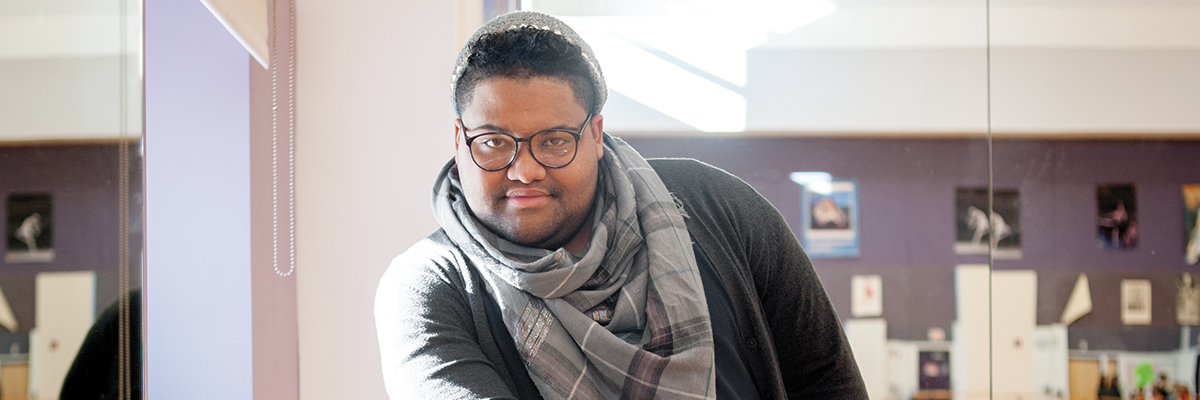
As a child, Bernabe had always been creative, favoring singing, dancing, and painting over sports. That didn’t go over well with his father in the Dominican Republic, where baseball is practically the national religion.
Even so, he did nothing to hide his personality, despite the fact that he didn’t fit in well with most of his male friends. But he didn’t tell them he was gay, a fact that he could barely admit to himself, though he had always known it to be true. Not only was Bernabe unprepared for the ridicule he would face from both male and female peers, he didn’t want to disappoint his family. His mother was a staunch Catholic, and he feared she would judge him for being gay. Given everything she had sacrificed to come to the United States for his education, he felt he couldn’t let her down.
“She used to ask me, ‘Why don’t you have a girlfriend?’And I used to go off on a tangent because I didn’t want to answer,” Bernabe says. “I wanted to be who I am, but I didn’t want to disappoint my mother. I wanted her to be proud of me.”
Even as he tried desperately to hide his sexual orientation, however, the choice to reveal it was made for him. One day as he was walking laps in gym class, he got into an argument with a female friend. Suddenly in front of everyone, she loudly declared that he was gay. “I was like, ‘Is she really saying this?’ I felt betrayed and lonely because she was a really good friend.”
Though he tried denying the accusations, the other students didn’t relent. They would bully him in the hallway, attacking him with anti-gay slurs, and referring to him as “ballerina.” Some told him he should be ashamed to be gay, that it wasn’t normal, and that he shouldn’t be going to school with the rest of his peers.
“People are very cruel,” says Maria Abyar ’17, a close friend from high school who is also a first-year student at Denison. “Especially in a town with a lot of Hispanics—they are always thinking about being macho.” As much as Bernabe tried to ignore the bullies, the constant teasing got to him. “It really, really affected my social life,” Bernabe says. “I became socially excluded and lost a lot of friends.” Over the months, he also became increasingly depressed, spending all of his time by himself.
“I didn’t want to go to school; I didn’t want to talk to anybody,” he says. “It hit me emotionally, I took their words very severely and thought nobody liked me.” It was then that Bernabe stopped dancing and thought seriously about quitting school, asking his mom if he could be home-schooled.
It was dance that kept Bernabe from becoming a statistic, because when Bernabe quit dancing, Quity Morgan, knew something was wrong.
Bernabe is the first to admit that he doesn’t have a traditional dancer’s physique. “People tell me I’m a chubby dancer,” he laughs, “But I just love myself the way I am. It wasn’t going to stop me from what I wanted to accomplish.” It was dance, it turns out, that kept Bernabe from becoming a statistic in the Latino dropout crisis, because when Bernabe quit dancing, Quity Morgan, the high school dance instructor, knew something was wrong.
She invited him to an after-school dance program, and she introduced him to other students at the school who had come out as gay. “She had been around the gay community,” says Bernabe. “She explained that many kids were going through the same thing.”
He began spending more and more time around the dance studio, where Morgan recognized his talent and enthusiasm. “He had a desire to learn and have fun with dance that impressed me,” she says. “When he joined the dance program, he didn’t know anything that was going on, but he had a willingness to push through.”
Dancing became more than social support for Bernabe—it became a way for him to express himself. He began conquering his depression and regaining his confidence. “Dancing is my life—it’s my outlet to everything,” he says. By sophomore year, Bernabe was taking senior-level dance classes, three periods a day at Lawrence High’s Performing and Fine Arts School.
“After that, he was full-force,” says Morgan, who watched his transformation from a shy kid into an outgoing one. “He went through a rampage of change.” Morgan helped guide him through the transition, telling him it is important to be kind and to treat other people with respect—as he had wanted from his peers. “She taught me how to be a man,” says Bernabe.
Bernabe gradually began to come out to others around him—including his mother. “It was really hard for me,” she says now. “But I reflected on it, and talked to God and decided I was going to accept and love him no matter what. The fact that he prefers to be intimate with a man doesn’t change the fact that he’s a man, and I am proud of him and accept him for who he is.”
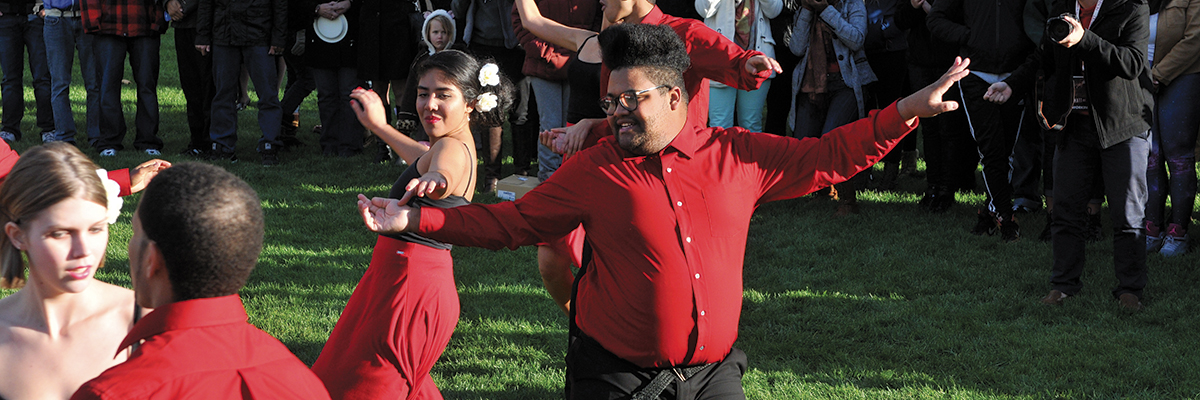
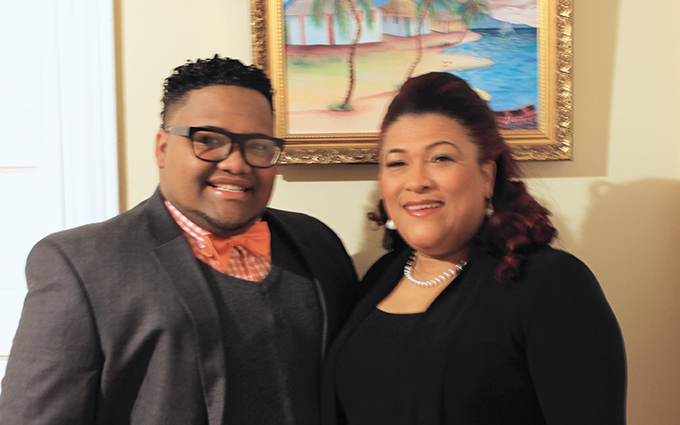
His mother’s acceptance changed their relationship, and Bernabe began letting her more and more into his life. “My mom is more than a friend—she is my diary,” he says. “Before, I never used to go to my mom for advice about anything. Now I go and tell her everything.”
All of Bernabe’s hard work paid off both in and out of the dance studio. His last two years of high school, he twice won First Place in the annual “Dancing with the Stars” performance, in which dance students partnered with an inexperienced teacher to lead them in a dance. “My first year, I won with the samba,” he says. “This woman never moved her hips in her life, and by the time she went up there she was shaking those hips like a Latina.”
The ribbons for the competition hang proudly on his wall in a row of awards, along with a “Dancer of the Year” award, a leadership award, and several academic awards. The walls are also filled with photographs and paintings that Bernabe has done over the years, including photographs of bridges and machinery that he took in some of Lawrence’s old mills.
One photo captures a dilapidated mill that had been burned out in a fire, with a bright blue tarp in one window flapping in the breeze. Later when his photography teacher was flipping through his portfolio, he stopped at the image and encouraged Bernabe to submit it to the Scholastic Art & Writing Awards, a competition run by the School of the Museum of Fine Arts in Boston. Bernabe won.
Though he’s proud of his award, Bernabe didn’t think much of the image at the time. He had simply snapped it while out for a walk in a pensive mood. It was just another dilapidated building left for demolition that millions of others had passed by without a second glance.
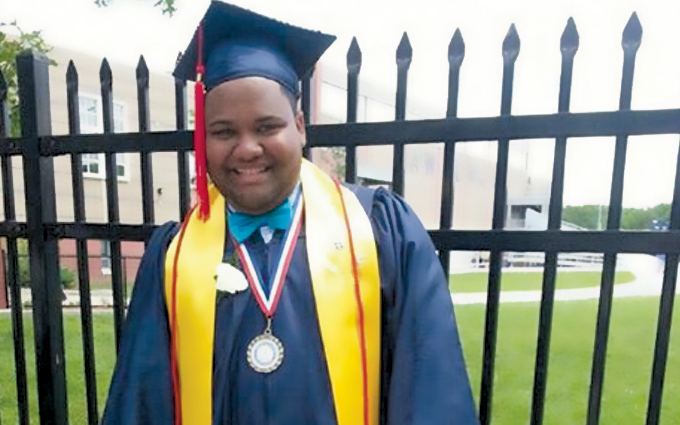
In his senior year of high school, one of Bernabe’s teachers heard about a PBS documentary called Los Graduados/ The Graduates, that would highlight education success stories of Latino students, and she encouraged him to apply. Though he was initially hesitant, Bernabe agreed to be interviewed by the producers and was accepted in the first round.
“We were immediately taken with his story,” says Bernardo Ruiz, the documentary’s executive producer, who saw something special in Bernabe. “In some ways, Juan’s story is very representative of many youth in Lawrence—like many students he had come from the Dominican Republic as a young boy, and his mother really sacrificed for his education.” Ruiz and his fellow producers were struck by the confidence with which Bernabe overcame the social pressure at school.
“What the series tried to do was showcase the support structures that have helped students complete their education, not in a Pollyanna-ish way, but looking at what worked,” says Ruiz. “For Juan, it was his mother, but it was also this arts program at Lawrence High, which he said was a safe space where you can be yourself. That touched on something important to me—when you are in high school, those places where you can be yourself are the places that can help you build.”
Along with Bernabe, the documentarians featured five other students, including a single mother from Chicago, an undocumented immigrant from Georgia, and a homeless girl from New York. They followed Bernabe around the school with cameras for a week, filming him in classrooms and even capturing his victory in the second Dancing with the Stars competition.
On the night the documentary aired, a student from California messaged Bernabe through Facebook, telling his own story of being gay and bullied in high school, and saying he was about to drop out. Seeing Bernabe’s story made him change his mind. Since the documentary first aired, Bernabe has regularly gotten similar messages, both online and in person, from other gay teens looking for advice. “Kids come out to me, and I am able to guide them on how to come out with pride. It opened a lot of doors for me. I got to touch a lot of hearts.”
While he has always been sure of who he wants to be, the experience of overcoming bullying in high school has made him even more confident.
“I have a pretty set personality, it’s not going to change,” he vows. Now, as a first-year Posse Scholar at Denison, he has already returned to Lawrence several times since he graduated to check in with Morgan and be there to provide an example of success to support the next generation of students. “People always ask me, ‘Why do you come back?’” Answering the question, he says, “I always come back because I loved it here. I had a rough time here—and I had a really amazing time here.”
Michael Blanding is a Boston-based investigative journalist whose work has appeared in The Nation, The New Republic, Salon, Consumers Digest, The Boston Globe Magazine, and Boston Magazine.

